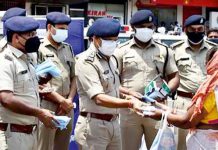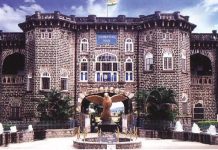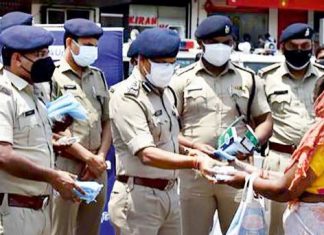
Maharashtra police steps up fight against pirated content
In a unique initiative the cyber cell of Maharashtra police under the directives of the home department has started a ‘Digital Crime Unit’ with the objective of eliminating websites that upload pirated content. The move came in the wake of requests by representatives of the Motion Picture Association of America seeking intervention of Chief Minister Devendra Fadnavis in stopping the upload of pirated content related to the entertainment Industry.
The contention being that the uploaded pirated content, including that of Hollywood and Bollywood on the internet causes losses worth billions of dollars annually. Contents from the entertainment industry like movies, music albums, books and softwares are regularly uploaded on the internet. The content owners suffer massive losses since the content is not purchased but pirated. While in US& UK there are stringent norms against pirated content, it proliferates in South East Asian countries. In India, though anti-piracy laws exist, there is no proper machinery to implement them.
 “In a bid to contain piracy, a multi-stakeholder model has been created on a pilot basis after an extensive study of London Metropolitan Police’s ‘PIPCO’ unit and keeping in the view the Indian conditions a digital crime unit has been set up to study online piracy. Around 9,000 websites, into piracy activities were studied and 1300 were shortlisted by applying 19 parameters based on the type of content being uploaded or downloaded and the number of downloads. Further study led to some concrete results,” said an officer of the Cyber Cell.
“In a bid to contain piracy, a multi-stakeholder model has been created on a pilot basis after an extensive study of London Metropolitan Police’s ‘PIPCO’ unit and keeping in the view the Indian conditions a digital crime unit has been set up to study online piracy. Around 9,000 websites, into piracy activities were studied and 1300 were shortlisted by applying 19 parameters based on the type of content being uploaded or downloaded and the number of downloads. Further study led to some concrete results,” said an officer of the Cyber Cell.
A three stage action plan has been devised for the 100 websites that were found at fault. In the first stage, all ecosystem players including the source and their advertising agencies are warned to desist from supporting illegal activities. In the second stage, web servers are blocked and domain names are cancelled. The third stage of registering a crime comes into play if similar content is uploaded but that becomes an uphill task because the content is generally uploaded from other countries. A similar unit is being developed in the states of Telangana and Karnataka, but Maharashtra is the first state to formally begin work.
Valedictory Address of the Prime Minister at DGP & IGP conference
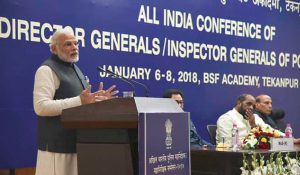 A two day DGP & IG conference on Jan 07& Jan08, 2018 was held at BSF Academy, Tekanpur in Madhya Pradesh. The high level meet was attended by the top officers of the state police forces and central police organizations. The last three conferences were held in Guwahati, Rann of Kutch and Hyderabad. DGP & IGP conference is an annual event in which top police officers from all over the country share and discuss security related issues. At his valedictory address, on the concluding day of the conference, Prime Minister Narendra Modi spoke at length on several issues and drew attention of the top officials towards problems arising due to social media and cyber-crimes.
A two day DGP & IG conference on Jan 07& Jan08, 2018 was held at BSF Academy, Tekanpur in Madhya Pradesh. The high level meet was attended by the top officers of the state police forces and central police organizations. The last three conferences were held in Guwahati, Rann of Kutch and Hyderabad. DGP & IGP conference is an annual event in which top police officers from all over the country share and discuss security related issues. At his valedictory address, on the concluding day of the conference, Prime Minister Narendra Modi spoke at length on several issues and drew attention of the top officials towards problems arising due to social media and cyber-crimes.
With the venue of the conference having shifted from Delhi to different venues since 2014, the nature and scope of the conference has changed, recalled the prime minister. He appreciated the efforts of the officers who have been instrumental in facilitating this change. The conference is more relevant in the context of challenges and responsibilities facing the country. The prime minister commended the country’s security apparatus for their work in securing the country. “The quality of discussions have improved,” observed the prime minister and congratulated the officers at the conference for delivering leadership, despite often having to operate in an environment of negativity. The prime minister also presented President’s police medals for distinguished services to Intelligence Bureau (IB) officers. During his address, the prime minister congratulated and appreciated the medal winning officers of the IB, for their dedication and commitment to service. Union Home Minister Rajnath Singh and Union Ministers of State HansrajAhirand KirenRijiju were also present on the occasion.
The key notes of PM’s address were:
There is an emerging global consensus towards information sharing on illicit financial dealings and India could play a key role in achieving this. India is an “organic entity” and not an “assembled” one, hence the police officers of the states should open up and share information on illicit financial dealings.
Cyber security issues should be dealt with immediately and should receive highest priority and in this context, the prime minister particularly emphasized on the importance of social media. Messaging should rely on local languages for greater effectiveness.
Technology enables pinpointing problem areas causing radicalization of youth. While openness in communication is getting increased acceptance worldwide, there is a need for greater openness among states too, on security issues. Security cannot be achieved selectively, or alone, and for that breaking of silos and information sharing among states can help make everyone more secure.
With well-defined objectives for the police force, there is a cohesion in the execution. The conference has helped the top police officers in achieving a holistic view of the problems &challenges and provided them with a new vision. The range of topics being discussed are more broad-based over the last two years. The prime minister suggested that the follow up should continue through working groups, all the year round. In this context, he specially emphasized the importance of involving younger officers. This would greatly help in improving effectiveness of the exercise.
‘Inspector’ for a day
The Mumbai police recently made headlines for their heartwarming gesture of assigning seven-year-old cancer patient Arpit Mandal with the role of an inspector for a day. Arpit always dreamt of becoming a police officer some day, and the Mumbai police fulfilled his dream and ambition, even if it was only for a day.
Mumbai police joined hands with Make-a-Wish India Foundation to fulfill Arpit’s dream, and provided him with an opportunity to assume the role of a police officer for a day at the Mulund police station. Make-a-Wish Foundation works to fulfill the wishes of children belonging to the age group of three to seventeen suffering from life-threatening diseases.
The Mumbai police posted several pictures of Arpit at the police station on its Twitter handle. “Mulund police station was completely won over by the undaunted spirit of 7-year-old Arpit Mandal, fighting cancer! If we could, we would fulfill all his wishes beyond just being a police inspector for a day- #ProtectingSmiles @MakeAWishIndia,” said a post by Mumbai police.
Women police in charge of eight police stations
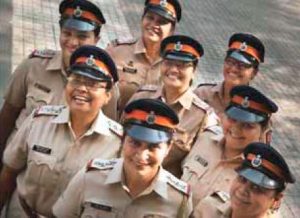 In a landmark move, Mumbai police created history with eight women police functioning as station in-charges at the same time. The women police station in-charges are–Alka Mandave (Airport police station), Rashmi Jadhav (Cuffe Parade police station), Mrudula Lad (Sion police station), Lata Shirsat (Sahar police station), Jyotsna Rasam (Vanrai police station), Rohini Kale (Pantnagar police station), Vidhyalaxmi Hiremath (Aarey police station) and Kalpana Gadekar (BKC police station). The move is set to make women feel at ease and comfortable in reporting crimes against them. Policing requires consent and respect of the community that is policed. Appropriate representation in the police force of the religions, castes, and genders of society is important for effective policing. Gender equality in policing will go a long way in reinforcing trust in the police within women in particular. A better representation in the police force will only contribute to making policing more effective and more humane.
In a landmark move, Mumbai police created history with eight women police functioning as station in-charges at the same time. The women police station in-charges are–Alka Mandave (Airport police station), Rashmi Jadhav (Cuffe Parade police station), Mrudula Lad (Sion police station), Lata Shirsat (Sahar police station), Jyotsna Rasam (Vanrai police station), Rohini Kale (Pantnagar police station), Vidhyalaxmi Hiremath (Aarey police station) and Kalpana Gadekar (BKC police station). The move is set to make women feel at ease and comfortable in reporting crimes against them. Policing requires consent and respect of the community that is policed. Appropriate representation in the police force of the religions, castes, and genders of society is important for effective policing. Gender equality in policing will go a long way in reinforcing trust in the police within women in particular. A better representation in the police force will only contribute to making policing more effective and more humane.
According to the research report titled, “Rough Roads to Equality- Women police in South Asia” by Commonwealth Human Rights Initiative, an independent, non-partisan, international non-governmental organization, mandated to ensure the practical realization of human rights in the countries of the Commonwealth, the generic view that ‘policing being a man’s job’ was the major hurdle for policewomen in their careers.
The report also discusses that authorities often fail to understand the potential contribution of women in effective law enforcement. The report observes that in India, policewomen are mostly assigned desk jobs or tasks that are far from front line policing. Due to this, very small percentage of policewomen in India occupy senior ranks and majority of them serve in lower ranks. This scenario thus proves to be a significant barrier to improving the overall justice system to female victims of gender-based violence since women are generally reluctant to report crimes such as rape or sexual harassment to male officers.
Several other difficulties such as toilets for women, discomfort while interacting with male colleagues, high rates of miscarriage due to lack of facilities for pregnant women, lesser promotions and district postings for women, along with many other socio-cultural issues due to inherently male dominated culture prevalent in the police prove to be hindrances in their careers.
This initiative of Mumbai Police should encourage incorporation of more women in the police forces in significant role.
Exposition of Applications & Ideas
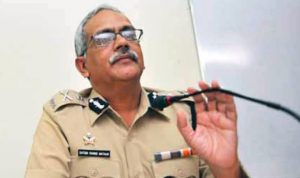 Satish Mathur -Director General of Police, Maharashtra announced recently that the state police would soon be organizing an exposition of all the applications and innovative ideas based on technology that have been developed by different police units, at Mumbai. Following the event, the best of the ideas would be rolled out for the police units across the state.
Satish Mathur -Director General of Police, Maharashtra announced recently that the state police would soon be organizing an exposition of all the applications and innovative ideas based on technology that have been developed by different police units, at Mumbai. Following the event, the best of the ideas would be rolled out for the police units across the state.
The announcement was made at an event organized by the Aurangabad range Inspector General of Police – Milind Bharambe, to showcase the mobile-based applications developed there along with customized phones that are set to take transparency, accountability, swiftness in investigation and conviction rate to another level.
Speaking on the occasion, the DGP said, “Our units in different parts of the state are making a better use of technology in day-to-day policing. We plan to hold an exhibition to showcase the applications developed by our police units from across the state. The best practices from those applications would be incorporated in a single application and would be rolled out for units across the state.”
Government allocates Rs. 13,385 Crores to strengthen policing
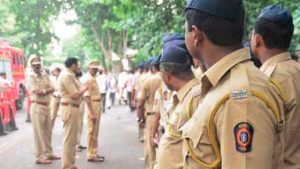 The state government has allocated Rs. 13,385 crores for strengthening and modernization of the police force in the budget. Of the total funds allocated Rs 8,000 crore have been set aside for paying salaries of the police personnel and the remaining Rs. 5,000 crore will be used for police modernization, purchase of ammunition, administrative expenditure, police housing and new projects.
The state government has allocated Rs. 13,385 crores for strengthening and modernization of the police force in the budget. Of the total funds allocated Rs 8,000 crore have been set aside for paying salaries of the police personnel and the remaining Rs. 5,000 crore will be used for police modernization, purchase of ammunition, administrative expenditure, police housing and new projects.
The state government has budgeted Rs. 165 crore for installing CCTVs in all police stations and connecting them with a central control room. A budgetary allocation of Rs. 25 crore has also been set aside for completing the ongoing Crime and Criminal Tracking Network and System (CCTNS) project.The projects that will be taken up in the 2018-19 also include purchase of two patrolling boats for protection of fishermen and security of the coastal areas. A new project called the visitors entry management system has been proposed for all police stations in the state. Under the project, information regarding whether the complaints of the visitors are addressed in a timely manner will be collected and made available to the supervising officers. Rs. 115 crore has been allocated for this project.
7-storey Police Bhavan to come up at Nagpur soon
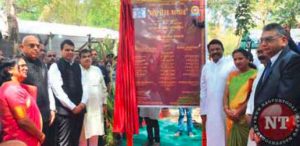 Nagpur, the second capital of Maharashtra Will soon have an imposing seven storey building housing offices of commissioner of police and other high-ranking officials. Chief Minister Devendra Fadnavis and Union Minister for Surface Transport and Shipping Nitin Gadkari recently laid the foundations for a new Police Bhavan in the city. The building complex is likely to come up behind the existing office of Commissioner of Police at Civil Lines.
Nagpur, the second capital of Maharashtra Will soon have an imposing seven storey building housing offices of commissioner of police and other high-ranking officials. Chief Minister Devendra Fadnavis and Union Minister for Surface Transport and Shipping Nitin Gadkari recently laid the foundations for a new Police Bhavan in the city. The building complex is likely to come up behind the existing office of Commissioner of Police at Civil Lines.
The hi-tech office complex spread over 1.90 lakh sq. ft premises will have a number of offices. The construction cost of the building has been pegged at Rs. 89crore.The control rooms of Nagpur city police and rural police will also be housed in same precinct but will function from an independent complex. The new building will have hi-tech communication facilities and a conference hall.
“There has been an emphasis on modernization of the police force since the last three years. CCTV cameras have been installed in cities, forensic labs have been set up in the district so that police force can respond more effectively using the technology,” said the chief minister during his address.
“Maharashtra has become the first state in the country to set up hi-tech CCTNS (Crime and Criminal Tracking Network and Systems) and thus started the facility of registration of e-complaints. Increasing the conviction rate was also another goal set for the state police. In that direction, legal and technical evidence gathering methods were adopted in the state and for that forensic and cyber forensic labs set up would prove very useful,” addedthe chief minister who also holds the Home portfolio.
At the event, Union Minister NitinGadkari said “Pollution has become a major problem in the country and it needs to be addressed urgently. Electric vehicles must be considered for use by police too. We have set the target to introduce Bharat Stage-VI or BS-VI norms for vehicles by 2020. The number of road mishaps on Nagpur city roads have reduced, faulty roads are the major cause of accidents. We have identified blind spots on the National Highways and rectified them by spending Rs.12000 crores.”
Action against those advocating Virginity Tests
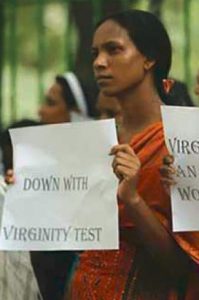 The police have been directed to take suomotu action by lodging cases against those publicly advocating virginity tests, Minister of State for Home – Ranjit Patil told the state and directions to this effect have been sent to all police stations. The assurance came after a Shiv Sena MLC brought to light the instances of virginity tests being conducted on brides before their wedding within the Kanjarbhat community which is enforced by caste panchayats.In January several young men were beaten up in Pune’s Pimpri area for opposing this regressive practice. Such incidents take place despite the existence of the Maharashtra Prohibition of People from Social Boycott Act 2016. The state would provide protection to those trying to reform regressive customs within the Kanjarbhat community.
The police have been directed to take suomotu action by lodging cases against those publicly advocating virginity tests, Minister of State for Home – Ranjit Patil told the state and directions to this effect have been sent to all police stations. The assurance came after a Shiv Sena MLC brought to light the instances of virginity tests being conducted on brides before their wedding within the Kanjarbhat community which is enforced by caste panchayats.In January several young men were beaten up in Pune’s Pimpri area for opposing this regressive practice. Such incidents take place despite the existence of the Maharashtra Prohibition of People from Social Boycott Act 2016. The state would provide protection to those trying to reform regressive customs within the Kanjarbhat community.

